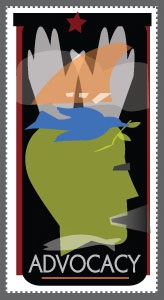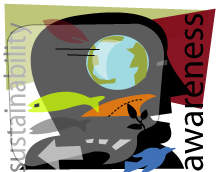First, the “our and the us” of collaboration.
 For us here at EarthSayers.tv the “our and the us” are the leaders of sustainability, the experts, teachers, business and civic leaders, citizens from all walks of life. It’s the organizations, old and new, in the sustainability movement encompassing the “isms” such as environmentalism; concepts such as biodiversity; principles such as permaculture, issues such as climate change, projects such as The War Room, and new technologies found in using our planet’s gifts with the conservation principles of reduce, reuse, and recycle. We call these leaders sustainability advocates and the organizations “for benefit,” building on the fledgling movement started by the Corp B people, searching for a common ground that drives prosperity, not just profits, a new sector of the economy.
For us here at EarthSayers.tv the “our and the us” are the leaders of sustainability, the experts, teachers, business and civic leaders, citizens from all walks of life. It’s the organizations, old and new, in the sustainability movement encompassing the “isms” such as environmentalism; concepts such as biodiversity; principles such as permaculture, issues such as climate change, projects such as The War Room, and new technologies found in using our planet’s gifts with the conservation principles of reduce, reuse, and recycle. We call these leaders sustainability advocates and the organizations “for benefit,” building on the fledgling movement started by the Corp B people, searching for a common ground that drives prosperity, not just profits, a new sector of the economy.
It’s not about the money.
When we approach for benefit organizations we believe we have something useful to you and you have something useful to us. And it’s not money. That’s been sucked out of the system so efficiently no government, business or non-profit can figure out where it went or if it will ever come back. No one seems to know where the end of the nozzle is and who has their hands on it. Right now it isn’t pointed in our direction that’s for sure. But if there is some money left on the table, we need to share it using cooperative revenue models.
It’s about our assets.
People
On our part, one of our assets, and the most important one, is our people. Yours too. We can do things you can’t and vice versa, and the proof for collaboration yielding more creative and useful solutions is indisputable. The commerce model of buyer and seller is competitive in nature, so let’s call what we do partnerships and stress collaboration among our people and your people.
Online and YouToo.
Another asset is our Websites that reach out into the World and, if we all cooperated, would be linked to one another, creating higher rankings, a bigger reach, more followers, more investors for all of us. What drives our Web development is open sourced, flexible, leverage-prone, and the source of connecting with the world, including the monied nozzle handlers. It’s a Web not a city center block of discrete buildings, where what we share is hidden underground, and the power is in private ownership and profits at all costs.
The Crowd
The third is our contacts, stakeholders, shareholders, colleagues, clients, members, and friends. How would they benefit from our working together? And would they find the benefit useful enough to return to us financial resources for the sustainability of our organizations to continue with our work? The only way to know the answer to this is work together on strategic initiatives, get feedback, learn from our efforts.
 Reputation and Innovation
Reputation and Innovation
Fourth is reputation and innovation. Why do I put these two together? Well, typically, innovation doesn’t have a track record, it’s a solution to a problem, a new “brand” and hopefully an original one that solves a big problem. Without a track record. reputation must be earned and cannot be compromised early on by large sums of money or questionable affiliations so the innovative folks need a reputable partner(s). Get my drift. We may have the innovation, you the reputation or vice versa, but we need each other.
Secondly, the process of asset-based collaboration
Ed Morrison and his team at I-Open.org are innovators in civic engagement. They design and deliver engaging civic forums that encourage citizens to engage in conversation about complex topics, while building stronger civic networks. These forums point toward action: translating ideas into transformative initiatives. The basis of this action is a process Ed calls Strategic Doing. Central to strategic doing and to asset-based collaboration are four questions that lead towards a mutual goal ” to articulate a clear direction and then to define initiatives that align with this direction…Thick, trusted networks evolve that are strategic. They help us learn faster, make decision faster, and act faster.”
The four questions:
What could we do together? Exploring our assets to find new opportunities.
What should we do together? Focusing on one opportunity at a time and defining, clearly, the “strategic outcomes” we want.
What will we do together? Launching new initiatives by aligning our resources with “link and leverage” strategies.
What are we learning together? Learning what works by executing and measuring what happens.
Our job as leaders, Ed points out, is to “keep people focused and the process open…And leadership is a shared responsibility, distributed within the group.” A world view of asset-based collaboration using the discipline of strategic doing and beginning with the four questions is where we are at, come join with us.
About Ed Morrison
 Ed Morrison is founder of I-Open, the Institute for Open Economic Networks, based in Cleveland, Ohio and is a member of the staff of the Center for Regional Development at Purdue University and
Ed Morrison is founder of I-Open, the Institute for Open Economic Networks, based in Cleveland, Ohio and is a member of the staff of the Center for Regional Development at Purdue University and
Economic Policy Advisor for the WIRED initiative in North Central Indiana. Our thanks to Ed and his staff for their generous sharing of ideas and information and for the work they are doing in our economically challenged communities, especially my hometown, Cleveland, Ohio.
